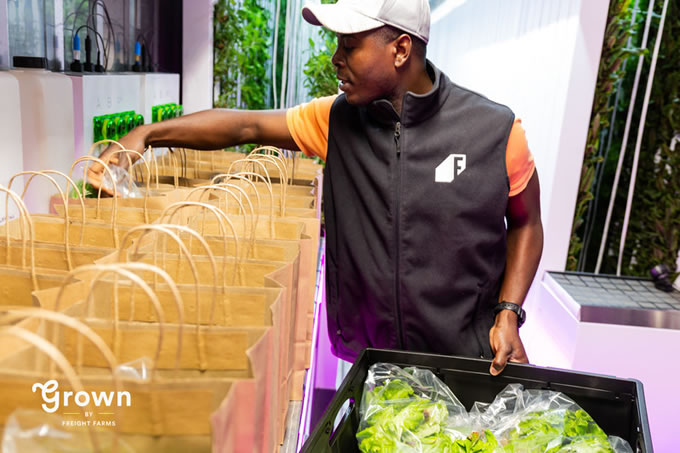Freight Farms Announces 'Grown,' the World's First On-Site Vertical Farming Service
Freight Farms, the leading innovator of smart hydroponic software and containerized growing environments, today announces the addition of Grown by Freight Farms, an on-site vertical farming service, to its product line. With Grown, Freight Farms will not only install its signature hydroponic farm—the Leafy Green Machine™—on site, but staff a designated farmer to operate, monitor, and maintain the farm completely.

By eliminating the need to train staff for farming, Grown can immediately integrate with any foodservice operation, employer amenity package, or produce supply chain. Clients choose what to grow, and how that produce will be distributed within their organization. Ease of integration makes Grown ideal for corporations, universities, residential communities, hospitals, and other clients committed to food transparency and wellness.
Farming in a controlled environment means clients can depend on consistent costs and quality year-round, regardless of season. Leafy Green Machines can be installed mere steps from the plate, drastically reducing food-miles. They consume just five gallons of water per day or less, and require no major construction to deploy.
"Our mission with Grown is to provide a solution to institutions that see the immense value of local produce, and would rethink their sourcing methods if challenges like personnel and facilities management were reduced," says Brad McNamara, CEO and Co-Founder of Freight Farms.
The Grown program is already supplying B.GOOD, a Boston-based farm-to-table restaurant chain, with lettuce for its popular Cousin Oliver Burger. Meanwhile, 3D design software company Dassault Systèmes enjoys a thriving CSA program for employees at its Waltham, MA campus.
"Since Google installed their Leafy Green Machine in 2014, institutions all over the world have used them to promote involvement and education around nutrition, sustainability, and technology," says Jon Friedman, Freight Farms COO and Co-Founder. "Now, by removing the burden of managing those farms internally, we hope to reach more people than ever."
Freight Farms is currently accepting new Grown clients in New England, with plans to roll out nationwide in 2019.
Average Grown packages start at $5,000 / mo., which includes custom crop scheduling, maintenance, supply replenishment, 24/7 farm monitoring, and all farming operations, such as seeding, transplanting, and harvesting. Add-ons range from marketing and branding services, to in-farm educational events and on-campus CSA programs.
To learn more, visit FreightFarms.com/Grown.
About Freight Farms
Founded in 2010, Boston-based Freight Farms has established itself as the leader in the containerized agriculture industry. With its flagship product, The Leafy Green Machine™, the company was the first to integrate smart, hydroponic, vertical farming into an intermodal freight container. To date, Freight Farms' global customer base includes more than 200 farms across 38 states and 13 countries.
For more information, please visit FreightFarms.com, Instagram, or Facebook.
Comments (0)
This post does not have any comments. Be the first to leave a comment below.
Featured Product

